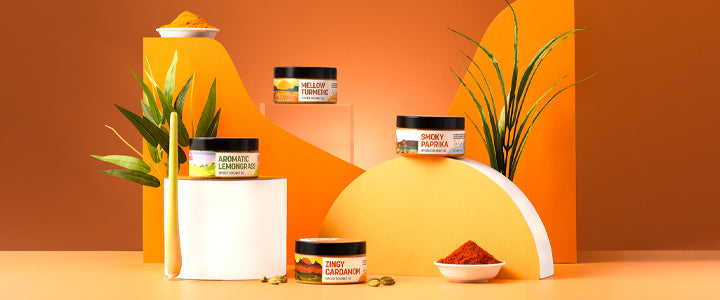Salt

Salt is neither a spice or herb since it is not plant-based. Instead, it is considered a seasoning or condiment. We use salt every day, and all of the Zing Foods Coconut Cooking Oils have salt in them. So knowing a little more about this seasoning was a real eye-opener!
The eruption of volcanoes can also leave behind landmasses that are very rich in salt. Ocean salt primarily comes from minerals washed down from rocks on land and openings in the seafloor.
It is worth noting that sea salt increasingly has become polluted with microplastics. This doesn't mean you have to stop using sea salt, but you may want to read the connected link below if the impact of this is of interest to you and your health.
Salt exists beyond our plant. On Mars, deposits occur in low-lying areas surrounded by channels and fissures consistent with the erosion caused by running water. Jupiter's moon Europa harbours a planetary ocean of liquid water beneath its thin-crust Europa's oceans may be as salty as those on Earth and therefore capable of supporting life. The Cassini spacecraft detected a plume of water and ice emanating from the south pole of Enceladus, one of the Saturnian moons. Cassini passed through the plume in 2008 and found salt-rich grains of ice close to the moon's surface, suggesting the presence of a salty ocean beneath the crust.
An adult human body contains about 250g of salt, and the body naturally excretes any excess.
Sodium enables the transmission of nerve impulses around the body. It is an electrolyte, like Potassium, Calcium and Magnesium; it regulates the electrical charges moving in and out of the cells in the body. It controls your taste, smell and tactile processes. The presence of Sodium ions is essential for the contraction of muscles, including that most significant muscle, the heart. In addition, it is fundamental to the operation of signals to and from the brain. Without sufficient sodium, your senses would be dulled, and your nerves would not function.
Salt has been in use long before recorded history. About 4,700 years ago, the Chinese Png-tzao-kan-mu, one of the earliest known writings, recorded more than 40 types of salt. It described two methods of extracting and processing salt, similar to methods still in use today. Writings on salt no doubt also existed on the clay tablets of ancient Babylon and Egyptian papyri.
Cheshire was on a Neolithic trade route that crossed the salt fields where Iron-Age Britons probably traded Westmoreland stone axe-heads for salt.
Rome partly paid roman soldiers in salt. It is said to be from this that we get the word soldier – 'sal dare', meaning to give salt. From the same source, we get the word salary, 'salarium'.
Until the 19th century, the primary use for salt was to preserve food for the winter months. Salt was probably the first traded commodity. If unavailable locally, it would have to come from afar by packhorse or boat (or, in desert lands, by camel caravan.)
There are so many recipes containing salt I thought I would pick two of my current favourite chefs out there. Tom Brown, an incredible chef who wowed the crowd this summer with his dishes at the Peligoni Club House Party Week https://www.peligoni.com/ . I'm looking forward to visiting his restaurant Cornerstone early next year. https://www.greatbritishchefs.com/chefs/tom-brown
James Martin a local Hampshire Chef for his inclusion of the Fox's recipes on his saturday morning programmes, The Fox were one of the first to stock the Zing Foods Coconut Cooking Oils. What can I say! Great taste! https://www.jamesmartinchef.co.uk/recipes/turbot-seaweed-butter-parsley-oil-leeks-vegetables
Credit to the following web pages where the above information was sourced. If you would like more information please select link
How is salt collected: https://www.youtube.com/watch?v=0vVyw2rVA4Q
Microplastics in table salt: https://www.ascent2health.com/blog/is-your-sea-salt-contaminated-with-microplastics
Salt on other Planets: https://sciencing.com/salt-other-planets-23945.html
Salt & the human body: https://saltassociation.co.uk/education/salt-health/salt-function-cells/
Salt History: https://saltassociation.co.uk/education/salt-history/




Comments